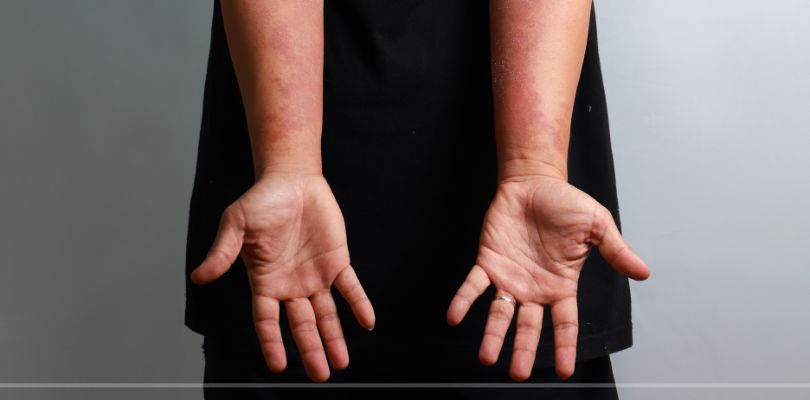What to Avoid and What to Eat
8 Worst Foods for Eczema
Certain foods can trigger or worsen eczema symptoms. Here are some of the worst offenders:
1. Dairy Products
Milk, cheese and other dairy products can be common triggers for people with eczema, especially if you have a sensitivity or allergy to dairy.
When it comes to fibromyalgia and hormone replacement therapy there is some evidence that suggests it could help relieve symptoms. Find out more here.
2. Eggs
Eggs are another common allergen that can trigger eczema flare-ups in some individuals.
3. Nuts
Certain nuts, especially peanuts, can cause allergic reactions and exacerbate eczema symptoms.
4. Soy Products
Soy can be a trigger for some people with eczema, particularly those with soy allergies or sensitivities.
5. Gluten
Wheat and other gluten-containing grains may worsen eczema in people with gluten sensitivity or celiac disease.
6. Processed Foods
Foods high in preservatives, artificial colors and flavors can trigger eczema symptoms. Processed foods also often contain high levels of sugar and unhealthy fats, which can contribute to inflammation.
7. Citrus Fruits
Oranges, lemons and other citrus fruits can irritate the skin and trigger eczema flare-ups in some people.
8. Spicy Foods
Spices can cause heat in the body, which may lead to itching and aggravate eczema symptoms.
5 Best Foods for Eczema
On the flip side, certain foods can help manage eczema by reducing inflammation and supporting skin health:
1. Fatty Fish
Salmon, mackerel and sardines are rich in omega-3 fatty acids, which have anti-inflammatory properties that can help soothe eczema symptoms.
2. Leafy Greens
Spinach, kale and other leafy greens are packed with vitamins and antioxidants that support skin health.
3. Probiotic Foods
Yogurt, kefir and sauerkraut contain probiotics that can improve gut health, which may help reduce eczema symptoms.
4. Quercetin-Rich Foods
Foods like apples, blueberries and broccoli contain quercetin, a natural antihistamine that can help reduce inflammation and allergic reactions.
5. Foods High in Vitamin E
Avocados, almonds and sunflower seeds are rich in vitamin E, which helps protect the skin from damage and supports overall skin health.
Treatment Options for Eczema
Managing eczema often requires a combination of treatments and lifestyle changes. Here are some treatment options:
Topical Steroids
Corticosteroid creams and ointments are commonly prescribed to reduce inflammation and relieve itching.
Moisturizers
Keeping the skin hydrated is essential. Use thick, fragrance-free moisturizers to lock in moisture and protect the skin barrier.
Antihistamines
Oral antihistamines can help reduce itching and prevent flare-ups, especially if allergies trigger your eczema.
Phototherapy
Exposure to controlled amounts of natural sunlight or ultraviolet light can help reduce symptoms in some people with eczema.
Medications for Severe Cases
For more severe cases of eczema, doctors may prescribe immunosuppressive drugs or biologics that target the immune system.
Avoiding Triggers
Identifying and avoiding triggers, including certain foods, is a crucial part of managing eczema.
Changing Up Your Diet
Eczema can be a challenging condition to manage, but by making smart dietary choices and using the right treatments, you can keep your symptoms under control. Avoiding trigger foods like dairy, nuts and processed foods can help reduce flare-ups, while including anti-inflammatory and skin-friendly foods like fatty fish and leafy greens in your diet can support overall skin health. With the right approach, you can manage eczema effectively and improve your quality of life.
Learn about which foods to avoid with sickle cell disease.







